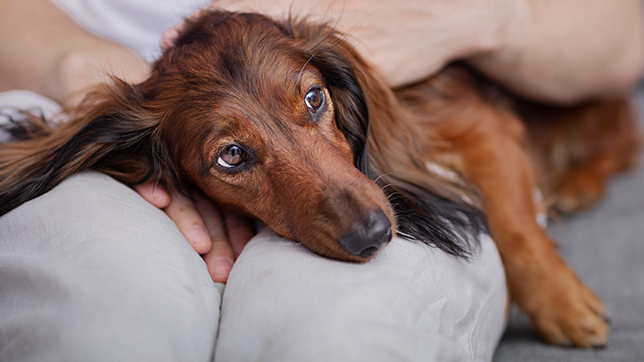6th December 2022
Upset stomachs and sickness
There’s nothing worse than knowing your pup has an upset tummy or isn’t quite feeling like themselves. And it’s probably left you with some unanswered questions and wanting to know how it happened in the first place and how to prevent it from happening again.
We’ve teamed up with the vets at Joii to bring you the ins and outs of puppy sickness and diarrhoea.
Why do puppies get sick?
We know that the last thing you might want to walk downstairs to after a good night’s rest (or not because the toilet training never seems to stop!), is runny accidents or puddles of vomit but it’s important to understand that if it happens, there’s a reason for it.
They might be stressed
Growing up can be a stressful time for some puppies, especially when you consider the changes they go through when they’re old enough to leave the litter. They move into a new home with new people, have new rules to follow and new skills to learn. Much like with humans, stressful changes can cause us to have an upset stomach - it’s the same with our pups too.

Eaten something they shouldn’t have
Young pups can be hard to keep track of, as they’re always either trying to find new things they can soothe their teething gums with, or mistakenly eating strange foods and bits and bobs on the floor. If your puppy manages to break off pieces and swallow whatever they’re chewing on, or eats something that’s toxic to dogs, they could get sick and will need veterinary attention. Don’t forget, as an Animal Friends dog customer, Joii Pet Care is free to use for those moments of concern or uncertainty.
A change in their diet
When you bring your puppy home for the first time, you might have decided to feed them a different diet and brand from the one they were fed by the breeder or rescue centre. That’s okay, but it shouldn’t be swapped suddenly as this can cause problems such as vomiting and diarrhoea. If you’re thinking of switching their food, break the days down into manageable blocks and gradually increase the amount of new food you give to your pup while decreasing the old brand or type of food at the same time.
Eating too fast
Puppies get excited about everything, especially food, with mealtimes being one of their favourite times of the day. If you notice your puppy vomits soon after eating, they may be eating too much too quickly. Try feeding smaller portions spread over more meals or try using a puzzle feeder to help slow them down.
An illness
Because your puppy’s immune system is still developing, their vomiting and diarrhoea can be a sign of an illness or virus they might have picked up. Try to avoid public places like parks and shops until your puppy has received all their vaccinations and boosters as infections can easily spread in these places.
Preventing upset stomachs and sickness
There are some precautions you can take to try and protect your puppy against some causes of sickness and diarrhoea. These include:
Vaccination
Vaccinating your puppy can help them grow into a healthy dog that remains free of infectious diseases while preventing them from passing nasty diseases on to other animals around them.
Worming treatment
Regularly deworming your dog can help prevent any problems resulting from the parasites, keeping your pup as happy and healthy as can be.
Keep a watchful eye
Puppies can be great at scavenging so make sure they don’t have access to anything they shouldn’t eat. If they manage to get their paws on something dangerous or toxic, make sure to speak to your vet immediately.
Looking for more dog advice?
Find the information you need as we support you through every step of your journey with your canine companion.
Need puppy insurance?
Dog insurance can help cover the cost of veterinary treatment if your puppy gets injured or falls ill.
